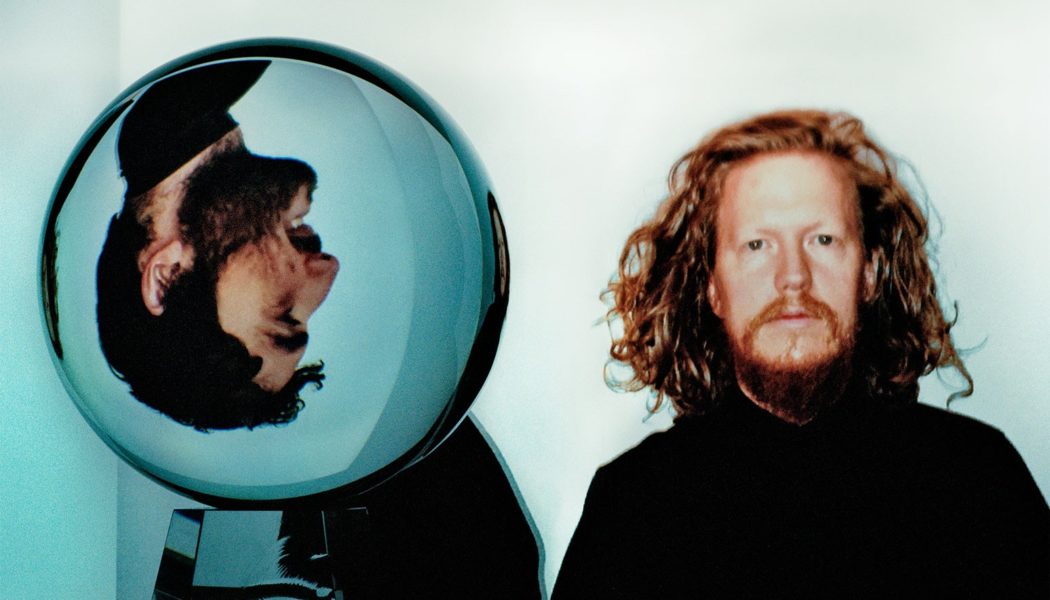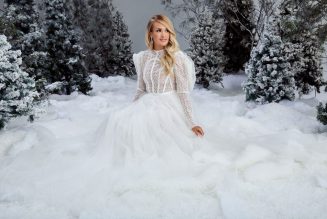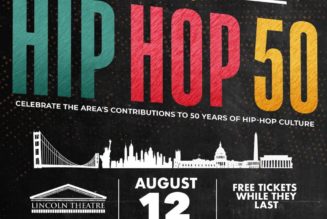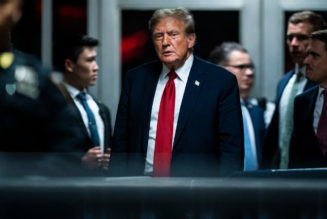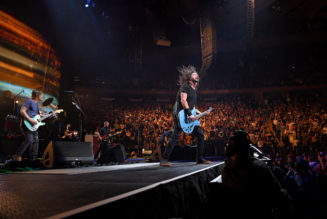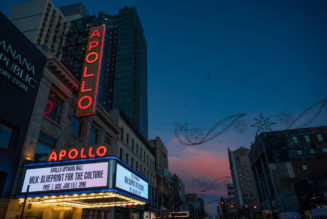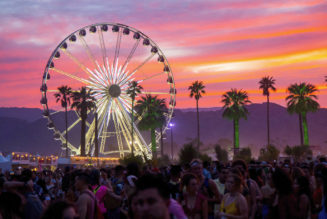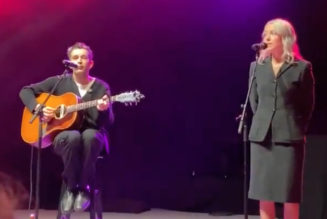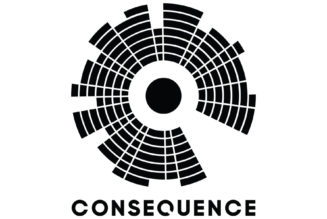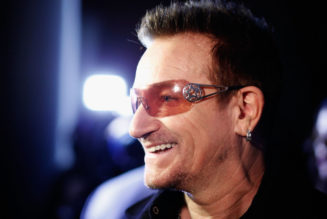
“We had never written songs that way before,” he continues. “There was a piano in the house we had rented; we sat at the piano. I mean, this is songwriting 101 stuff, but because we’re both tinkerers and producers and electronics are so important to what we do, we hadn’t tried that as an entry point into our music before.”
Spending an extended period of time together for the first time since the world tour behind Psychic wrapped in 2014, Jaar and Harrington spent a lot of time just talking, cooking and generally hanging out. “I remember most vividly,” Jaar recalls via email, “when we decided to go out into the yard just with a guitar and my phone to record voice notes. I remember Dave would always sit in the shade and I would sit in the sun, and a lot of musical ideas came from that.”
During this week long writing session (and a subsequent week writing and recording in Amsterdam, where Jaar was then living), they settled back in to the musical dynamic that delivered one of the best albums of the 2010s. Psychic fused a heady and cinematic electronic sensibility with Harrington’s psychedelically potent guitar, extending the transportive, acid-centric lineage of bands like The Grateful Dead and The Allman Brothers while also evolving this sound into the present. Most anyone who was at one (or many) of the shows behind Psychic gets a certain look of zeal in their eyes when attempting to explain how special those performances were.
With the new music, however, “Neither of us were after just creating a mood,” Harrington says. As songs took shape at the piano, the goal also became storytelling, with Jaar crafting philosophically-inclined lyrics (“Submit to the grace/The waters erase/Nothing left to see/I’m you and you’re me,” he sings on “The Limit”) exploring the concepts of grief, mourning and the existential challenges of existing on an often violent planet.
The music they made during those week-long session session in time morphed into the nine tracks on Spiral, the sophomore Darkside LP out today (July 23) via Matador Records. Spatial, meandering, contemplative moody, often darkly funky and thoroughly excellent, Spiral was mixed by Berlin-based Rashad Becker (Holly Herndon, KiNK, Ricardo Villalobos) and Brooklyn-based mastering engineer Heba Kadry (Björk, Japanese Breakfast and Garbage.) The process of bouncing music back and forth across the Atlantic took time, with the album not being held due to the pandemic, but simply because it wasn’t ready until now, three years after its inception. (There are no current plans for a tour behind the album.)
Here, Harrington and Jaar reflect on the process of creation, their unique musical alchemy, the phenomenon of their live performances and more.
Was it always a given that you guys were going to get back together?
Harrington: No, I think that it was always a choice that we could make. I think one of the great gifts of being a duo, and being our own idiosyncratic duo, is that we come together and do Darkside when we want to, when it feels right and when we’re inspired.
Was there something in particular you wanted to achieve or express via new Darkside music?
Jaar: Making music is the only way I have to understand the world around me. I think the song “Spiral” from the album brings together what the album is about. In the song the narrator speaks of the letters that continue to arrive at home for a loved one who has recently passed away. When I had that mental image, I found that it encapsulated the grief I feel as a human in this planet. The letters are like the fake candles in the song, signaling something that is not alive but still shining. For me, the album is about the feelings of grief and pain that we can’t easily translate to language. I make music because it’s the only way I know to deal with pain.
When you guys sat down to make music, were you surprised by what came out, or maybe more so sort of delighted by it?
Harrington: It’s so much fun to make music with Nico. In that way I wasn’t surprised — but it had been awhile, so I would say I was kind of delighted. [Laughs.] We talked a lot the first couple of days we were there and tried working in some new ways. We talked about what kind of things we wanted to try to make, and what kind of ideas we wanted to chase in the music. I guess I was pleased that we set up some challenges and new ideas that took us to places we hadn’t gone before.
What were those new ideas?
Harrington: We talked a lot about songwriting and about narrative and about trying to work from – I mean, there’s always kind of a thread of improvisation, even when we’re doing songwriting – so we talked about trying to thread that with almost more conventional songwriting techniques.
Was there a sort of a goal or imperative to evolve beyond or do something differently from what you guys did on Psychic?
Harrington: If any of that happened, that’s for you to say, not for me to say. But because of just who Nico and I are as musicians naturally, some form of change was going to happen. We had both done so many different projects since we last worked together. We’d both worked with so many other musicians and we both worked in other mediums, that I think that some amount of change was going to be fundamental when we re-instigated our collaboration.
In terms of the particular alchemy you two have, what do bring out in each other that you don’t necessarily achieve with other musicians?
Harrington: I think it’s an improvisation brain thing. From the moment we started playing together, there was so much improvising going on, from when we were doing the earliest shows of Nico’s Space Is Only Noise music to all the Darkside shows. We spent so much time in that zone, that we just kind of developed that psychokinetic, read-your-mind, same-idea-same-moment sort of thing that you just don’t get with everyone you play with. It’s a mix of some sort of cosmic luck and also time spent together. When those two things line up, that’s a kind of musical mind-meld a musician is lucky if they get with a couple of people in their lives.
Jaar: From the very beginning, working with Dave made me feel like I was stepping into a new sonic world. I think what he animates in me is curiosity. Psychedelic music — whether jazz, electronic music or “rock” or whatever — changed me when I was a teenager; it opened new doors. With Dave, I feel like we get to call ourselves a silly name and play to our teenage selves and not worry about all the boring adults in the room.
Did you guys know — you had to have known — that the fan demand for a Darkside reunion was there? The live experience and what you guys did with Psychic, I don’t think it’s just my friends and I, those were sort of spiritual life experiences for us and for a lot of people. What was your sense of the desire for new music?
Harrington: I guess I hadn’t thought about it much. I’d kind of been operating in my own sphere outside of the band, and every now and then I would play a gig and someone would come up to me and say, “Oh man, I love Darkside.” “Or, are you guys going to make another record?” I’d be like “I don’t know.” The fact that anyone out there at all is excited to listen to something you make is like, the ultimate gift.
I wasn’t forecasting for myself what that was going to look like, because you just kind of hope that that person is there regardless of what you’re doing. I’m really not trying to aw-shucks it or humblebrag my way out of this one, but, you know… I make free jazz records, and when ten people download them on Bandcamp I’m like, “This is success.” Honestly it’s been really exciting to see people get excited about Darkside. I’m not big on expectations. I think a good music practice should extend to every step of the process, and I think if you go into it with the expectation of trying to make something you care about, that should be the end game.
Fair enough. I guess what I’m getting it with these questions is the sort of devoted following you guys achieved with the first album and your live shows. When you were touring behind Psychic, did you experience those shows as something sort of singular?
Harrington: [Long pause, deep sigh.] I mean, yeah. Some of those shows were bananas… But on some level, they were all the same, and they were all one show that was constantly changing. Every time we played, the audience would be out there, and I would be right here, and Nico would be right in front of my face, and that was my experience of those 120 or 150 or however many shows we played that year and a half or whatever it was. They were all me and Nico, our pile of gear and our amazing crew. It was like its own system that would drop into sometimes small rooms, sometimes big rooms, sometimes festival stages.
I’m talking around this question. If the question is “are some of those shows singular,” the answer is yes, there are some of those shows that really stand out for this, that or the other reason. But every show was kind of about me and Nico trying to do the best and most in-the-moment version of everything, and feeling what was happening in that room, every time.
What story are you telling on Spiral? Does it extend the narrative of Psychic? If so, how?
Jaar: For me, Spiral is a lot about grief and the process of mourning. Mourning is a spiral, where in a cyclical motion you see objects again and again, and they slowly change their meaning every time you pass them. To mourn well, we must let these objects change meaning as they wish, and not hold on to their previous meanings. I feel more and more like this as I walk outside, the feeling that the world is constructed from ashes of something that has already burned and somehow our eyes still register the ashes of the unburned thing. We are having trouble adapting to new realities, and the clinging creates a lot of violence.
Psychedelic music is often about creating shifts in perception. My hope with all my music is to create these very tiny shifts, so that an object can change its shape or meaning with sound — or rather, so that we can see the inherent plurality and flux in everything. The paradox of the cover is that it seems like the protagonist is the orb — this monolithic thing — but the orb is just a change in perspective. The orb is a way to see the landscape otherwise. The way a spiral moves allows for a plurality of perspectives around a center. This plurality and flux is something to celebrate. What we have sometimes difficulty letting go of is the idea that an object could be one thing and that thing only — and so we are still treating the various perspectives we spiral around as distinct solid objects, when they are really just positionings on a spiral.
Like you said, you’re not out there playing the hits. That said, is there anything about the world of mainstream pop music that’s exciting to you right now?
Harrington: Yes, I think that there is, but I feel like I always operate a bit like a tourist in the world of pop music. And also like a voyeur. I feel like it’s a club I haven’t fully been invited into yet. I’d love to hang out there, but it hasn’t happened. I don’t know what that will look like whenever it does happen. Left to my own devices, I tend to go into stranger and stranger musical rabbit holes, and that’s kind of what happened to me over the last year and a half. But I love flipping on the radio, and I think there’s a lot of interesting pop music that’s happening right now. I don’t think I’m the most well versed in it.
When you do turn on the radio, is there one song that comes on, like do you hear a Dua Lipa song and you’re like, “Yes! My jam!”
Harrington: [Laughs.] The Olivia Rodrigo song, when it came out, I was like, “This is just killing me.” I love a good ballad. I mean, man, I love a good ballad.
No one’s impervious to the power of “Driver’s License.”
Harrington: Also I spent the last year and half listening to mostly Chicago free jazz from the ’70s and Thelonious Monk and The Allman Brothers, so when I get in the car and Olivia Rodrigo comes out, I’m like, “Yeah, this is all right.”

